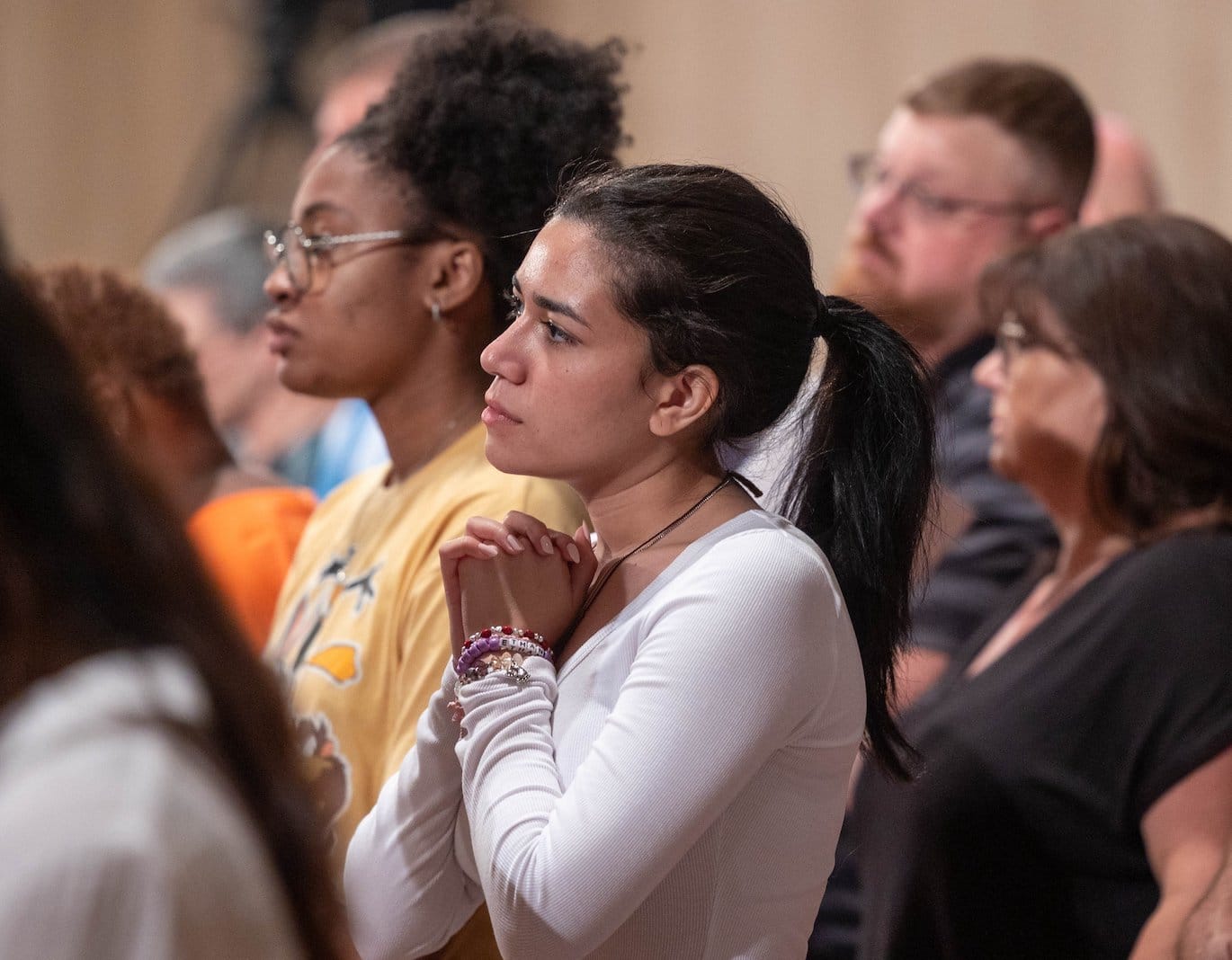When you hear that Christians are called to build the kingdom of God, what do you think that means?
• Being a missionary or speaker?
• Doing “something big,” like building a hospital or school?
• Volunteering at the local pregnancy help center or community food bank?
• Doing charity work in your parish or community?
You probably thought of all of these things and, if so, you’re right. Of course, as married people with kids, most of us are probably not going to get the opportunity to do those things as much or as often as we like. We can participate indirectly in these good works by remembering these ministries in our charitable giving, but sometimes, it feels like we’re not doing enough.
What if I were to tell you that as critical and important as charitable works like these are, they are not the primary means by which married couples and families build the kingdom of God? The primary way we build God’s kingdom is not by doing “big things for Jesus,” but rather by working to build strong marriages and family lives.
Bricks for a just society
If you’re like a lot of Catholics, that last statement fell flat. When I say this to clients in my pastoral counseling practice or listeners to my call-in radio program, I get a variety of dismissive responses that range from, “Well … yeah, I guess that too,” to, “Well, sure, but that feels like I’m trying to get extra credit for stuff I’m supposed to be doing anyway.”
Many of us have been conditioned to think that working to have strong, loving, joyful, healthy, and godly, marriage and family lives is somehow selfish. How does that feed the poor? How does that help the homeless? How does that do anything for anyone other than me? I mean, sure. Having a strong marriage and family life is, generally speaking, a good thing. But it’s not like it’s any great spiritual exercise. Right?
Well, in a word, “no.” Pope St. John Paul told us, “As the family goes, so goes the nation, and so goes the world in which we live.” Pope Francis echoed this insight when he wrote that the Church is a “family of families.” In other words, God calls Christian couples and families to be the bricks he uses to build a holy Church and a just society. If the bricks are crumbling, everything else falls apart. There’s no sense trying to build more onto your house (i.e., doing charitable work outside the home) if your foundation is cracked and your walls are crumbling. Or, as St. Paul put it, “If I give away everything I own, and if I hand my body over so that I may boast but do not have love, I gain nothing” (1 Cor 13:3).

Building a domestic church
Recently, on CatholicHŌM-Households on Mission (a family formation app providing expert coaching and resources for building strong Catholic families) we held a poll asking members to respond to the question, “I feel like my family committments prevent me from serving God and the Church as much as I’d like.” Seventy-six percent of respondents said that this was “true” for them.
It was a trick question. What most Catholic families fail to appreciate is that working to build a strong “domestic church” is the most important way you can serve the Church, especially if you are married and/or have children. The phrase, “domestic church” isn’t just a fancy Catholic term for a family. A domestic church is a family that’s (1) connected to God and each other through sacramental grace and (2) committed to living out God’s unique vision of love in their relationships with each other and the world. Rather than merely being members of a parish or consumers of the spiritual “products” the parish offers, a family that embraces its role of being a domestic church is called to be an active outpost of grace in a hurting world, an extension of the parish church that reaches all the places the Church can’t normally go (e.g., your home, workplace, school and the homes and hearts of non-Christian family members and friends). As the Catechism of the Catholic Church puts it, “The Christian family constitutes a specific revelation and realization of ecclesial communion and for this reason it can and should be called a domestic church” (No. 2204).
If you’re scratching your head as to what that means exactly, it’s just a fancy way of saying that a Christian family (especially a family that does the two things I listed above) isn’t just “sort-of like” a church. It is the Church as it exists in the world and carries God’s grace to the world. Families are certainly called to support their parish with their time and charitible giving but according to the Catholic theology of Church, families don’t primarily exist to support the parish. The parish exists to form families, or rather, the parish exists to help transform families into domestic churches that are capable of carrying the light of Christ to the world through their witness of love. As Pope St. John Paul put it, “The future of evangelization depends in great part on the Church of the home” (Familiaris Consortio, No. 52). Pope Francis agrees. He said, “The Church wishes … to reach out to families and ‘to help each family to discover the best way to overcome any obstacles it encounters'” (Amoris Laetitia, No. 200).
Best way to evangelize
What is the best way to evangelize others? It isn’t by quoting verses of Scripture or passages of the Catechism at them. And it isn’t by being able to argue points of doctrine with people. The best way to evangelize anyone is to show them the power God’s of love to satisfy the deepest longings of our heart to love and be loved in ways that enable us to flourish. That’s what everybody wants. When a Christian couple bears witness to God’s unique vision of love in their marriage, or when a Christian family lives out that vision of love in their relationships, the world takes notice. And when they don’t, the world takes notice of that too.
The credibility of any other ministry or charitable work you do is directly dependent on whether your marriage and family life are strong, warm, faithful and loving. Again, if you do all kinds of “big things for Jesus” but can’t bear witness to God’s love in your marriage and family life then you are a “noisy gong” (1 Cor 13:1, RSV). If that sounds like a hard saying, just see it as some straight talk from St. Paul. “If a man does not know how to manage his own household, how can he take care of the church of God” (1 Tm 3:5). As challenging as that message is, it doesn’t change the fact that its true. Doing charitable work is easy compared to learning how to share Christ’s love with your spouse and kids.

Don’t neglect your marriage and family
That’s not to say that you shouldn’t engage in Christian service in your parish or community unless your marriage and family life is perfect. Rather, it’s to emphasize that God doesn’t want us to neglect our marriage and family life to serve the Church or communuty. As Paul explains it, having your marriage and family life in order is a basic requirement for knowing if you’re ready to serve in other ministries. And, if having a better marriage and family life requires you to give less time to parish or community ministries, that’s not just alright. It’s your responsibility as a Christian disciple to attend to your marriage and family first.
Of course, as someone who directs a large pastoral tele-counseling practice (CatholicCounselors.com) that works with hundreds of Catholic couples and families around the world every year, I understand that Catholic households suffer from the same kinds of problems that every other household experiences. You might be in a difficult marriage. Your family might be struggling. That’s OK. No one expects your familiy to be perfect overnight — or at all. As Pope Francis has explained many times, “The Church is not a museum of saints, but a field hospital for sinners.”
No one should be ashamed of the struggles they face in building a loving, joyful, grace-filled domestic church. And no Catholic should hesitate to get they help they need to succeed in that work. But they should be encouraged to know that devoting the time, energy, and resources it takes to build a strong domestic church — even if it requires giving less time energy or resources to other ministries or charitable activities — is not only OK as far as the Church is concerned. It’s encouraged.
Building the kingdom of God starts at home. The time, energy and resources you spend building a strong domestic church counts as real service to the Church.







